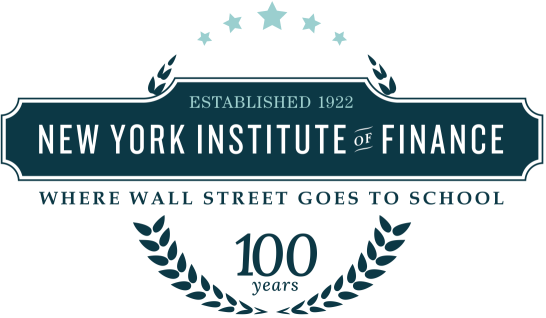Portfolio Management Professional Certificate
Develop core competencies in portfolio management. Learn how to conduct portfolio performance measurement and attribution. Review portfolio strategies for a variety of asset classes including fixed income, equity and alternatives.
CPE Credits: 35
Prerequisite knowledge:
- Intermediate MS Excel skills
- Basic probability and statistics
- Familiarity with fixed income instruments and concepts
- Familiarity with equity valuation concepts
This Professional Certificate comprises the following NYIF courses:
- Fixed Income Portfolio Management (Day 1)
- Equity Portfolio Management (Day 2)
- Hedge Funds (Day 3)
- Portfolio Management: Theory and Practice (Days 4 - 5)
Click here to download course curriculum
Watch our Portfolio Management taster video to learn more about the course:
Module 1: Review of Fixed Income Concepts
- Fixed income arithmetic
- Fixed income instruments
- Term structures of rates and yields
- How are bonds traded?
- Fixed income risk: Duration and Convexity
- Corporate bonds: Credit risk
Module 2: Passive Fixed Income Portfolio Management
- Fixed income indexes
- Index funds and replication techniques
- Tracking error minimization
- Cash flow matching
- Immunization techniques
Module 3: Active Fixed Income Portfolio Management
- Rate prediction strategies
- Yield curve strategies
- Interest rate scenario analysis
- Credit strategies
- Tactical allocation strategies
- Relative value stategies
Module 1: Review of Equity Valuation Techniques
- Importance and quality of earnings
- Present value models
- Multiples based valuation
- Asset-based valuation models
- Industry and company analysis
Module 2: Equity Strategies: From Stock Picking to Portfolio Management
- Structuring an equity portfolio
- Use of indexes
- Translating information into investment ideas
- Hedging with options
- Short selling
- Growth strategies
- Value strategies
- Blended strategies
Module 3: Modern Portfolio Theory
- Systematic vs. Unsystematic Risk
- Diversification
- Deriving beta
- Performance measurement and attribution
Module 1: Introduction to Hedge Funds
- Traditional investments and alternative assets
- Role of hedge funds in an investor's portfolio
- History of the industry
- Size and growth of the Industry
Module 2: Hedge Fund Operations
- Governing regulations
- Legal structures
- Documentation
- Outside service providers
- Prime brokerage
Module 3: Hedge Fund Strategies
- Market directional
- Corporate restructuring
- Convergence trading
- Opportunistic strategies
Module 4: Issues for Hedge Fund Investors
- Who can invest in hedge funds
- Due diligence
- Fees
- Portfolio monitoring
- Benchmarks and biases
- Leverage
- Risks for hedge funds
- Fund of funds
- Portfolio construction
Module 1: Measuring Risk and Return
- Return: Geometric and Arithmetic
- Holding Period, NAV
- Risk: Standard Deviation; Semi-variance; Correlation; VaR
- Market price of risk: CAPM, APT
- Liquidity risk
- Credit risk
Module 2: Analyzing Portfolio Performance
- Risk adjusted returns: Sharpe, Treynor, Jenson, Sortino, Calmar, Information Ratio
- Behavioral and technical considerations
Module 3: The Investment Decision Making Process
- Balancing risk and reward
- Roles of financial advisiors and portfoloio managers
- Life cycle investing
- Principle risk and real returns
- Creating portfolios for institutions and individuals
Module 1: Fund Structures
- Fund Types, ETF/Index, SMAs, Synthetic Funds
- Marketing strategies
- Fees, liquidity, regulations
- Industry trends
Module 2: Private Equity
- Venture capital
- Buyout
- Special situations
- Transparency issues
Module 3: Retirement and Estate Planning
- Wealth transfer through trusts
- Gifting
- IRAs, 401Ks and other Issues
- Taxation of Retirement Assets
Module 4: Desk Ready Skills Knowledge Check
